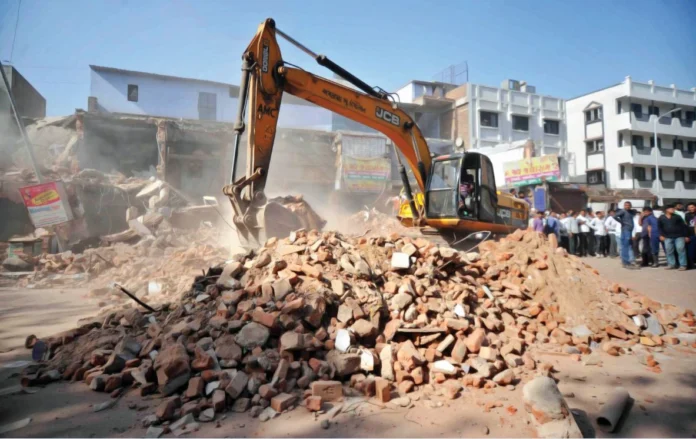By Dilip Bobb
Bulldozer justice has become a thorn in the side of justice, particularly in the BJP-ruled states of Uttar Pradesh and Maharashtra, with the authorities carrying out demolitions of properties, citing alleged criminal cases or encroachments as the reasons, without following the due process of law. Such capricious acts are not only legally untenable but also morally dissolute.
The Supreme Court recently pulled up the UP government for its “unconstitutional and inhuman” action of demolishing properties in Prayagraj town without following procedures, responding to a petition filed by a lawyer, a professor and three others. The petitioners argued that the Prayagraj Development Authority wrongly interpreted that the land belonged to gangster-politician Atiq Ahmed, who was killed in a police encounter in 2023. They also alleged that the demolitions were carried out within 24 hours of serving notices, leaving residents no time to appeal.
This prompted the apex court to comment that the government’s action “shocked our conscience.” Declaring the demolitions as “inhuman and illegal,” the bench of Justices AS Oka and Ujjal Bhuyan added that the appellants were “not given a reasonable opportunity to explain their decision,” and that the manner in which it was done “shows insensitivity on the part of the statutory authority.”
The Court also recorded significant loopholes in how the procedure was handled. While the show cause notice was issued under Section 27 of the UP Urban Planning and Development Act on December 18, 2020, it was affixed the same day. The Court noted that the demolition order dated January 8, 2021, was affixed, but not sent by registered post. The post was sent on March 1, 2021, and was received on March 6, 2021. The demolition took place a day after the post was received, giving the recipients no time to appeal or even react. The court ordered Uttar Pradesh’s Prayagraj Development Authority to pay a compensation of Rs 10 lakh each for demolishing five residential structures in March 2021.
Censorship By Wrecking Crew
Last week, the Brihanmumbai Municipal Corporation sent a team to the hotel that houses the studio where the controversial Kunal Kamra episode was filmed, in which he was critical, even abusive, about Maharashtra’s Deputy Chief Minister Eknath Shinde, and demolished what it termed an unauthorized shed. The studio had earlier been ransacked by a Shiv Sena mob. The owners were forced to shut down the studio.
That same day, the Supreme Court issued a notice to the Malvan Municipal Council for demolishing a shop and house of a family who had allegedly chanted “anti-India” slogans during an India-Pakistan cricket match. Also, that very day, the Nagpur bench of the Bombay High Court stayed the proposed demolition of a house of an accused in the recent violence in the city, but the order came too late. The JCB earth-mover had already done its work.
Crushing The Marginalised
The main problem with the demolition drive, or bulldozer justice as some call it, is that it mostly targets the poor, the vulnerable and minorities, adding a caste/communal angle to the drive which has happened in other BJP-ruled states as well, starting with Uttar Pradesh where Chief Minister Yogi Adityanath earned the nickname “Bulldozer Baba”.
More alarmingly, it has also spread to Punjab, where Aam Aadmi Party Chief Minister Bhagwat Singh Mann has also been allowing similar demolitions. State officials and bureaucrats in some cases are ideologically aligned to such actions. During one of the demolitions in Uttar Pradesh, a district magistrate clicked a selfie and shared it with the caption:
Supreme Court’s Stand: Bulldozers Have No Place In Justice
All these are against the Supreme Court’s directions laid down last November when it put up pan-India guardrails against such actions. The Court remarked that such demolitions “breached the principles of natural justice and violated the citizen’s right to shelter”. Action against the accused without following due process was “against the Constitutional ethos.”
He emphasized that the safety and security of a citizen’s home are fundamental rights deserving of protection.
The Legal Pushback Builds
From September 2024, a division bench of Justices BR Gavai and KV Viswanathan began hearing petitions against bulldozer demolitions following the demolition of Rashid Khan’s home in Rajasthan. On 1 October, it reserved judgement after hearing suggestions from state governments and petitioners.
Justice Gavai reasoned that the Court felt the need to frame some “binding directives” to control arbitrary and discriminatory actions by the state.
He noted bulldozer demolitions violated natural justice, the citizen’s right to shelter and inflicted collective punishment on the family of the accused.
The Bulldozer Spreads Like A Virus
Former Madhya Pradesh Chief Minister Shivraj Singh Chauhan earned the title of “bulldozer Mama” for his demolition drive. Following a rape incident in Rewa, Chauhan ordered a bulldozer to be used against the house of the accused. His successor Mohan Yadav has followed suit. Bulldozers were also used in Delhi and Gujarat against alleged rioters.
Some media reports suggest that certain communities perceive the use of bulldozers as biased. Critics argue that giving up on the rule of law and adopting “bulldozer justice” are signs of an authoritarian society.
“In such a society, the safety, life, and liberty of individuals would depend on the arbitrary decisions of state officials.”
Jahangirpuri: A Case Study In Communal Targeting
On April 16, 2022, during Hanuman Jayanti, riots broke out in Delhi’s Jahangirpuri, a Muslim-dominated area. On April 19th, BJP leaders wrote to the North Delhi Municipal Corporation (NDMC) pointing to illegal constructions by “rioters”. The next day, NDMC launched demolitions.
On April 20, the Jamiat-Ulama-i-Hind challenged the demolition as it was underway, arguing insufficient notice. A Supreme Court stay order was ignored by NDMC, which continued demolitions. On April 21, CPI(M) leader Brinda Karat and victims filed a petition highlighting the violation of the SC’s earlier stay.
—The writer is former Senior Managing Editor, India Legal magazine


